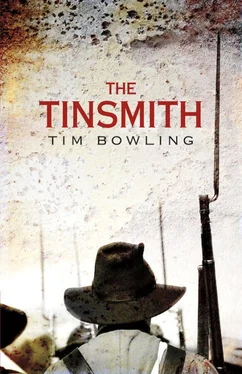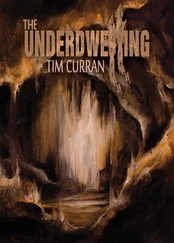But when John stood before the master, or when he walked slowly among the visiting farmers with a serving tray in his hands and listened to them argue that a war fought over slavery would be a foolish waste of money and lives, a desire for peace and stability rose up in him even as his circumstances remained largely unchanged.
But even with life going on much as always, the outbreak of war had seemed closer every day. As the newspapers heated up with opinions (Jabeth always relayed what he read) and gossip among whites and blacks reached a fever pitch, the master about lost his senses. He became convinced that the blacks were plotting to rise up and take over. For the first time, he let the new overseer, Orlett, take full charge of discipline on the farm. Food was held back: meat was rarely given and each black received only a peck of corn a week and had to grind it into meal by hand. But Caleb was skilled at trapping animals in the woods and good at teaching those skills too. So the families didn’t suffer overmuch from want. John knew they felt the change, though. Mostly they feared what could happen and not what was happening. Even though Daney never doubted that freedom was coming, she knew how right Caleb was about white folks. And the master’s behaviour troubled her. She said, just lie low and don’t give any cause for trouble, our time’s coming and all we has to do is bide it and wait.
So John worked harder in the house and especially in the fields on those rare occasions when the master sent him there. Because he did not like the way the new overseer studied him. His eyes had a hawk’s hunger and patience and he licked his thick, red lips as if waiting for a chance to uncoil the black snake whip from around his shoulders. So John never let up, never talked back. Besides, he knew he was strong and growing stronger and he loved to drive the oxen and cut wood and gather in the harvest and help with the corn shucking. And he enjoyed being with the field hands, for he rarely spent time in the slave quarters, preferring to stay around the big house and listen and watch.
One night the master had several guests over and they got to talking about their favourite subject: what to do with the niggers now that war seemed sure to come. Enoch Brand from over near Hagerstown laughed out of his ruddy face with its lips flapping like a horse’s and told the master that if he wanted to get anything at all for his property he’d better sell it quick while he still had a chance; otherwise, his property would just walk off on him, it had happened already, he’d heard tell of a plantation in Calvert County where the niggers set fire to all the buildings before they left. Oliver Kendrick, who farmed up near the north woods, scoffed and said, just let them try, they know they won’t get very far here. And the master trembled like a soaked hound and said he wasn’t so sure about that, hadn’t his slaves been getting more difficult, every month, one woman he’d owned for years seemed to laugh at him all the time even though her face showed nothing. That’s how it starts, Enoch Brand said, they get to thinking they have a right to be free and they might just as well be free, you might just as well count your losses right then and there.
After the guests had gone, the master called him into the dining room. The room always impressed John, no matter how often he entered it. The gleaming warmth of the long walnut table and scrollwork-backed chairs and of the tall liquor cabinet calmed him even as the fancy oak and glass chandelier took his breath away.
The master sat at the table, his left hand holding a tall wineglass, one finger of his right hand tracing the glass’s rim.
“John, I want you to tell me everything that’s being said in the slave quarters.”
To John’s surprise, the master’s voice shook more than usual, like his right hand, and his pale face seemed as fragile as the china plates stacked on the sideboard just beyond him.
“Especially what Daney and Caleb say. They’re up to something, I know it.”
Upset, John looked away, up to the chandelier. But all the little hanging glass lights trembled as if they were tears that belonged on the master’s face, and so John felt no protection from the sudden surge of anger that he tried in vain to hide. The thought of spying on Daney and Caleb was as unthinkable as it was unnecessary.
The master tightened his grip on the wineglass. His trembling jaw suddenly set, his blue eyes lost their watery blue and narrowed.
“If I do not get the truth, I’ll let Mr. Orlett do what he will. Do you understand?”
John nodded, swallowed dryly, and retreated slowly at a wave from the master’s right hand.
In the hallway, he stood a moment before the full-length wall mirror, studying his own face as if he could read what he should do there. But, as always, he found only his own confusion, his pale skin like the master’s, and the slight bulge to his eyes and the thickness of his bottom lip that he understood made him a servant. Daney and Caleb, he knew, were plotting nothing, and, as it turned out, after weeks spent around their shack and others, John discovered no news to report. The master grew increasingly agitated, he took more and more to drinking wine until his cheeks wore a constant stain, like the bruises in a windfall apple. Something was bound to happen. John knew it. Everybody seemed to know it.
The week before Christmas, cold but no snow. The hog-killing time. One morning the master called all the blacks together in the barnyard—Caleb and Daney and their six children and the five other families, about thirty folks in all, little children to the very old. John watched the breath flow from every mouth. The blacks shivered and wrapped their bare arms around their shoulders. Letta’s small child cried and she hushed it fast. Nobody else said a word. The smell of hogs’ blood thickened the air.
The master came out with the overseer, a short, stocky man with a large cleft in his chin and always a red ruff of whiskers framing his face like a half-circle of caked blood and a sparse clutch of hairs at his Adam’s apple. His cheeks showed white and patchy-red in the cold, like slices of bloody ham. He tapped a rawhide whip lightly against his thigh and kept grinning the way a dog does when it’s running. At every word the master spoke, the overseer twitched like a giant muscle.
The reason for the gathering was made plain enough. The master stood with one gloved hand on his hip, the other gloved hand holding a cane, and scanned the crowd of blacks slowly. But when he spoke, his eyes were raised, as if seeking an answer from the pink-streaked sky.
“A hog’s been stolen. And if it’s not returned by sundown, if the thief doesn’t confess to the crime, you’ll all be punished.” The master lowered his eyes. He dabbed at the corners of them with a white handkerchief before continuing. “I know I’ve always been too easy on you, too fair. It was your late mistress’s desire, and I’ve honoured it. But when you take advantage…” He paused to catch his breath, leaning on his tall cane with the bronze knob shaped like a horse’s head. His breathing was still audible, but he managed to control it. “Even so, if the thief confesses, I’ll see to it that you don’t all suffer for the crime.” He turned to the overseer and nodded.
The overseer pointed with his bullwhip in the direction of the shacks, and the downcast blacks, almost as one, turned to leave.
“John,” the master said after the other blacks had gone, “I want you to find out.” His old face was sickly, the cheeks sagging and bright red, his nose and eyes running. “I’m warning you too, if I don’t have that thief by sundown, I will recover my loss.” He paused, his gloved right hand trembled as he slowly raised it. Beside him, the overseer’s breath flowed like a panting dog’s. “If I have to, I’ll sell Jancey. I’ll have Orlett take her into the city tomorrow.”
Читать дальше












